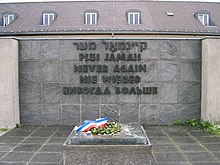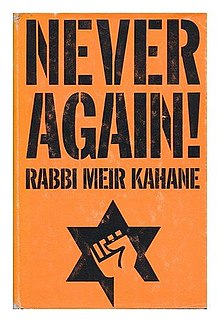Never again


"Never again" is a phrase or slogan which is associated with the
The exact meaning of the phrase is debated, including whether it should be used as a particularistic command to avert a second Holocaust of Jews or whether it is a universalist injunction to prevent all forms of genocide.
The phrase is widely used by politicians and writers and it also appears on many
Origins

The slogan "Never again shall
Between 1941 and 1945,
Definition


According to Hans Kellner, "Unpacking the semantic contents of 'Never Again' would be an enormous task. Suffice it to say that this phrase, despite its non-imperative form as a speech act, orders someone to resolve that something shall not happen for a second time. The someone, in the first instance, is a Jew; the something is usually called the Holocaust."
The initial meaning of the phrase, used by
Writing about the phrase, Ellen Posman observed: "A past though often recent humiliation, and an emphasis on former victimhood, can lead to a communal desire for a show of strength that can easily turn violent."[15] Meir Kahane, a far-right rabbi, and his Jewish Defense League made use of the phrase. To Kahane and his followers, "Never again" referred specifically to the Jews and its imperative to fight antisemitism was a call to arms that justified terrorism against perceived enemies.[11][3][16] The Jewish Defense League song included the passage "To our slaughtered brethren and lonely widows: / Never again will our people's blood be shed by water, / Never again will such things be heard in Judea." After Kahane's death in 1990, Sholom Comay, president of the American Jewish Committee, said "Despite our considerable differences, Meir Kahane must always be remembered for the slogan 'Never Again,' which for so many became the battle cry of post-Holocaust Jewry."[11]
Contemporary usage

According to Aaron Dorfman, "Since the Holocaust, the Jewish community's attitude toward
It is in wide use by Holocaust survivors, politicians, writers, and other commentators, who invoke it for a variety of purposes.[7][19] In 2012, Elie Wiesel wrote: "'Never again' becomes more than a slogan: It's a prayer, a promise, a vow ... never again the glorification of base, ugly, dark violence." The United States Holocaust Memorial Museum made the phrase, in its universal sense, the theme of its 2013 Days of Remembrance, urging people to look out for the "warning signs" of genocide.[11]
In 2016, Samuel Totten suggested that the "once powerful admonition [has] become a cliché" because it is repeatedly used even as genocides continue to occur, and condemnation of genocide tends to only occur after it is already over.[7] For an increasing number of critics, the phrase has become empty and overused.[8] Others, including Adama Dieng, have noted that genocide has continued to occur, not never again but "time and again" or "again and again" after World War II.[9][20][21][19][7][17] In 2020, several critics of the Chinese government used the phrase to refer to the perceived lack of international reaction to the persecution of Uyghurs in China.[22][23][24][25] On 1 March 2022, after the Babi Yar Holocaust Memorial Center was hit by Russian missiles and shells during the battle of Kyiv, Ukraine's President Volodymyr Zelenskyy argued that "never again" means not being silent about Russia's aggression, lest history repeat itself.[26]
Multiple United States presidents, including
The
Other uses


The rationale of "never again" also fueled the formation of
In the Philippines, "never again" has been used as a rallying cry for the commemoration and remembrance of martial law under Ferdinand Marcos,[38][39] and is usually chanted alongside the phrase "never forget" on occasions such as the annual commemorations of the declaration of martial law on September 21,[40] and on the anniversary of the People Power Revolution on February 25,[41] which is a public holiday in the country.
"Never again" has also been used in commemoration of
After the
The phrase has been used by political advocacy groups
Never again is also used in
See also
References
- ^ "A sign posted [probably in Buchenwald] that says, "Form the Antinazifront! Remember the Millions of victims Murdered by the Nazis/ DEATH TO THE NAZI CRIMINALS." - Collections Search - United States Holocaust Memorial Museum". collections.ushmm.org. Archived from the original on 4 June 2020. Retrieved 29 May 2020.
- ^ ISBN 978-0-674-04414-2. Archivedfrom the original on 9 July 2021. Retrieved 19 October 2020.
- ^ Mosaic Magazine. Archivedfrom the original on 17 April 2020. Retrieved 6 May 2020.
- ISBN 978-0-226-98157-4. Archivedfrom the original on 9 July 2021. Retrieved 10 May 2020.
- S2CID 162015828.
- ^ "Introduction to the Holocaust". Holocaust Encyclopedia. United States Holocaust Memorial Museum. 12 March 2018. Archived from the original on 11 October 2015. Retrieved 10 May 2020.
- ^ ISBN 978-1-317-64808-6. Archivedfrom the original on 1 February 2022. Retrieved 19 October 2020.
- ^ .
- ^ a b c d Power, Samantha (1998). "Never Again: The World's Most Unfullfilled Promise | The World's Most Wanted Man". Frontline. PBS. Archived from the original on 25 May 2020. Retrieved 7 May 2020.
- ^ "Universal Declaration". United Nations. Archived from the original on 27 May 2020. Retrieved 7 May 2020.
- ^ a b c d e f g "How the Holocaust motto Never Again became a rallying cry for gun control". Jewish Telegraphic Agency. 8 March 2018. Archived from the original on 24 October 2019. Retrieved 6 May 2020.
- ^ JSTOR 2505381.
- ^ a b c Dorfman, Aaron. "Responding to Genocide". My Jewish Learning. Archived from the original on 20 August 2016. Retrieved 6 May 2020.
- ISBN 978-1-139-44883-3. Archivedfrom the original on 9 July 2021. Retrieved 19 October 2020.
- ISBN 978-1-4443-9573-0. Archivedfrom the original on 1 February 2022. Retrieved 19 October 2020.
- ISBN 978-0-19-802104-9. Archivedfrom the original on 9 July 2021. Retrieved 19 October 2020.
- ^ ISBN 978-0-8135-4390-1. Archivedfrom the original on 9 July 2021. Retrieved 19 October 2020.
- ISBN 978-1-317-03375-2. Archivedfrom the original on 4 June 2020. Retrieved 7 May 2020.
- ^ ISBN 978-1-351-93052-9. Archivedfrom the original on 31 January 2022. Retrieved 19 October 2020.
- ^ "Genocide: "Never again" has become "time and again"". Office of the United Nations High Commissioner for Human Rights. 18 September 2018. Archived from the original on 4 June 2020. Retrieved 6 May 2020.
- ^ McCallum, Luke (6 April 2019). "Publications". International Association of Genocide Scholars. Archived from the original on 23 May 2020. Retrieved 7 May 2020.
The twentieth century has been called "The Age of Genocide." In the aftermath of the Holocaust, the slogan "never again" was coined; yet since 1945 we have seen the mass slaughter of Bengalis, Cambodians, Rwandans, Bosnians, Kosovars, and Darfuris, to name only a few.
- ^ Ibrahim, Azeem (3 December 2019). "China Must Answer for Cultural Genocide in Court". Foreign Policy. Archived from the original on 20 January 2020. Retrieved 3 February 2021.
- ^ Dolkun, Isa (14 September 2020). "Europe said 'never again.' Why is it silent on Uighur genocide?". Politico. Archived from the original on 3 March 2021. Retrieved 3 February 2021.
- ^ Sartor, Nina (3 December 2020). ""Never Again" all over again". The Silhouette. Archived from the original on 7 February 2021. Retrieved 3 February 2021.
- ^ Kaye, Jonah (23 August 2020). "Uyghur Camps And The Meaning Of 'Never Again'". The Detroit Jewish News. Archived from the original on 7 March 2021. Retrieved 3 February 2021.
- ^ Harkov, Lahav (1 March 2022). "Russia strikes Babyn Yar Holocaust memorial site in Ukraine". The Jerusalem Post. Retrieved 1 March 2022.
- ^ Fishel, Justin (17 March 2016). "ISIS Has Committed Genocide, Obama Administration Declares". ABC News. Archived from the original on 10 January 2020. Retrieved 7 May 2020.
- ^ Rieff, David (1 February 2011). "The Persistence of Genocide". Hoover Institution. Archived from the original on 23 April 2020. Retrieved 6 May 2020.
- ISSN 1364-2529.
- ISSN 0162-895X.
- ^ "Israel-Hamas war opens up German debate over meaning of 'Never again'". The Guardian. 22 November 2023. Retrieved 5 December 2023.
- ISBN 978-0-367-65039-1.
- ^ Fernández Meijide, Graciela (24 March 2020). ""Nunca más", un compromiso vigente". Infobae (in European Spanish). Archived from the original on 24 March 2020. Retrieved 6 May 2020.
- ^ "Día de la Memoria en Argentina: el necesario recuerdo de la dictadura". France 24. 24 March 2019. Archived from the original on 18 December 2019. Retrieved 6 May 2020.
- ^ Schneider, Marcelo (24 July 2020). "35 years of "Brasil: Nunca Mais"". World Council of Churches. Retrieved 13 December 2022.
- PMID 10082694.
- ^ Mictlan, Monsieur (30 November 2021). "'Monument Tortura Nunca Mais' ('Torture Never Again')". Atlas Obscura. Retrieved 13 December 2022.
- ^ Diez-Bacalso, Mary Aileen (29 September 2022). "Never again to martial law". Union of Catholic Asian News.
- ^ La Viña, Tony; de Belen, Bernardine (11 September 2022). "Never again, never forget: The violent memory of Martial Law". Rappler.
- ^ "Philippine Protesters Vow to 'Never Forget' Marcos Era Abuses". Voice of America. 21 September 2022.
- ^ Burgonio, TJ (26 February 2013). "Aquino to PH: Never again". Philippine Daily Inquirer.
- ISBN 978-0-7619-2931-4. Archivedfrom the original on 1 February 2022. Retrieved 19 October 2020.
- ^ "Jews Protesting Detention Centers: Inside Never Again Action". Jewish Journal. 17 July 2019. Archived from the original on 23 April 2020. Retrieved 6 May 2020.
- ISSN 1911-0359.
Further reading
- Port, A.I. (2023). Never Again: Germans and Genocide after the Holocaust. Harvard University Press. ISBN 978-0-674-27522-5.
